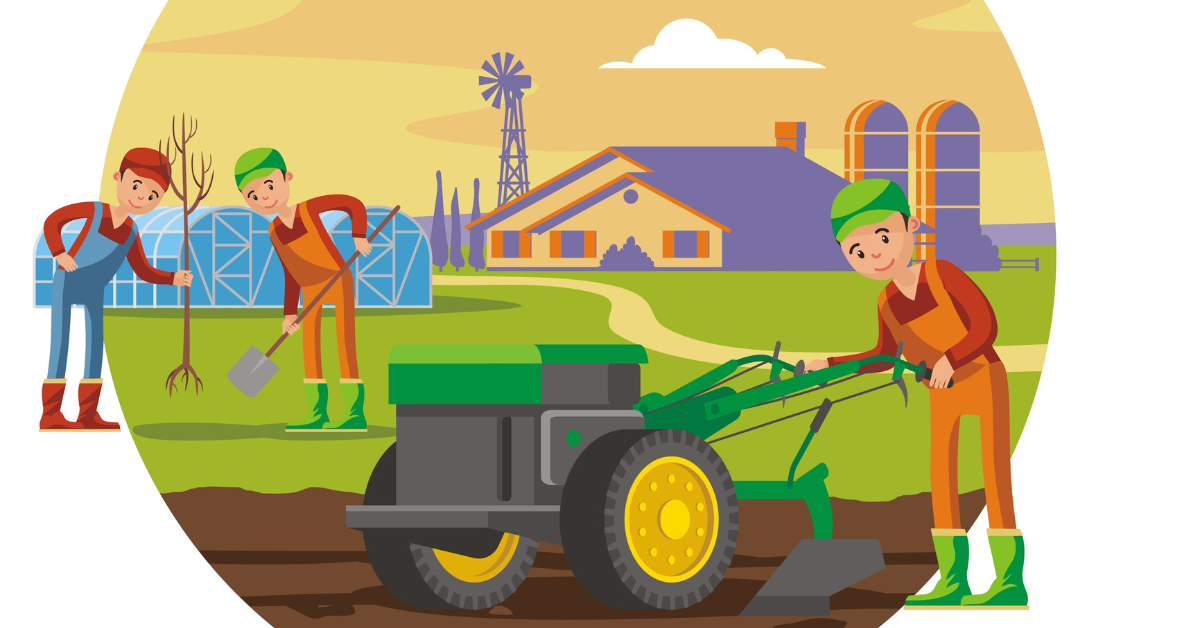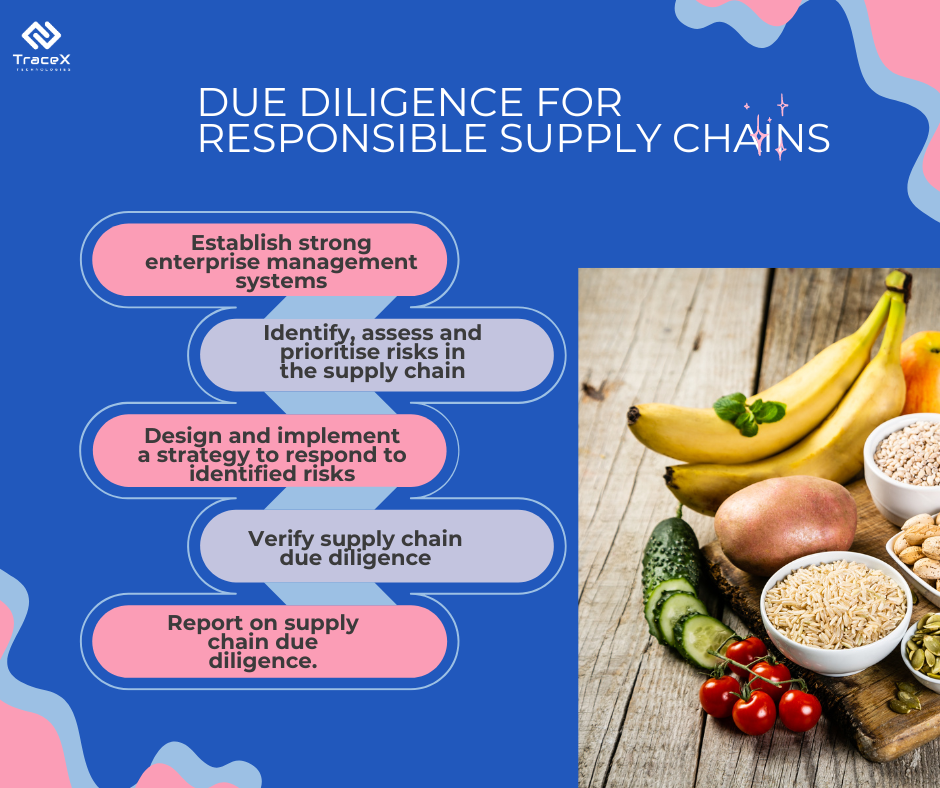Contact: +91 99725 24322 |
Menu
Menu
Quick summary: Explore key regulations and compliance strategies for responsible agriculture supply chains. Learn how businesses can build sustainable, transparent, and ethical practices with the help of technology.

From farm to fork, consumers want to know that their food is grown and sourced ethically, with a focus on sustainability, fairness, and minimal environmental impact. Climate change, social justice concerns, and tightening regulations have made it clear: the way food is grown, harvested, and distributed has serious consequences for the planet and communities worldwide. Building responsible supply chains in agriculture isn’t just a nice-to-have—it’s a must-have.
To make meaningful strides toward sustainable practices, agribusinesses must adhere to a web of key regulations designed to protect people and the environment. These rules aim to ensure transparency, ethical sourcing, and compliance with evolving sustainability standards. However, navigating this complex regulatory landscape can feel overwhelming. By understanding core regulations and adopting proactive strategies, companies can build ethical, responsible supply chains that meet consumer expectations, avoid penalties, and drive long-term success.
Key Takeaways
When we talk about responsible agricultural supply chains, we’re focusing on making every step of the process—growing, harvesting, processing, and distributing agricultural products—more ethical, transparent, and sustainable. It means ensuring that the food and other agricultural products we consume are produced in a way that respects the environment, supports fair labor practices, and fosters long-term economic viability.
Responsible supply chains can significantly reduce the environmental impact of agriculture, which is a major driver of deforestation, biodiversity loss, and carbon emissions. By prioritizing sustainable practices, businesses can combat climate change and protect ecosystems.
Socially, responsible supply chains promote better working conditions and economic opportunities for farmers and laborers. When workers are treated fairly and communities thrive, the entire supply chain becomes more resilient and productive.
Economically, companies that embrace responsibility often see long-term benefits, such as stronger customer loyalty, reduced risks, and better compliance with regulations. As more consumers demand sustainably and ethically sourced products, businesses that lead the way in responsibility have a competitive edge.
The EUDR is a significant regulation aimed at curbing global deforestation caused by agricultural products like soy, beef, palm oil, cocoa, coffee, and more. Businesses exporting these commodities to the EU must prove that their products are deforestation-free and legally produced according to the laws of their country of origin. This means companies need to trace their supply chains and demonstrate compliance to reduce their environmental impact and ensure sustainability. Essentially, EUDR raises the bar for transparency and makes it clear that sustainability isn’t optional—it’s mandatory for doing business with Europe.
The SDGs are a set of 17 goals established by the United Nations to promote sustainability, social equality, and environmental protection globally. For agriculture, this means promoting responsible consumption and production (Goal 12), combating climate change (Goal 13), and ending poverty (Goal 1), among others. These goals serve as a framework that guides agribusinesses toward practices that benefit society and the planet, encouraging initiatives like ethical sourcing, reduced resource use, and better livelihoods for farmers and communities.
These widely recognized sustainability certifications help businesses demonstrate their commitment to responsible and ethical practices.
United States Regulations
In the U.S., several policies support sustainable agricultural practices, including the Farm Bill, which funds conservation programs, research, and rural development. Policies like the National Organic Program set standards for organic agriculture, emphasizing sustainability, biodiversity, and reduced chemical usage.
India’s Agribusiness Policies
India has introduced policies to promote sustainable agriculture, such as the Paramparagat Krishi Vikas Yojana (PKVY), which supports organic farming, and initiatives to reduce chemical usage and promote natural farming practices. India is also exploring traceability and digitization in agricultural supply chains to enhance transparency and market access for smallholder farmers.
By navigating these global and regional regulations, businesses can drive meaningful change and ensure their supply chains align with sustainable and ethical practices.

Consumers and regulators want to know exactly where agricultural products come from and how they’re produced. This is where digital tools like blockchain come in. Blockchain technology helps create a secure, unalterable digital record of every step in the supply chain, from farm to final product and ensure supply chain compliance. It ensures that data is transparent and easy to trace, building trust and minimizing the risk of fraud or unethical practices. By enabling real-time tracking, blockchain makes it possible for businesses to quickly identify and address any issues, such as contamination or non-compliance, before they escalate.
Compliance is a team effort, and engaging with suppliers is key. Building strong partnerships and fostering open communication throughout the supply chain ensures that everyone understands and adheres to sustainability and compliance goals. This often involves working with smallholder farmers, providing them with training, tools, and resources that help them meet regulatory standards. Capacity-building programs can cover everything from sustainable farming techniques to the use of digital tools for record-keeping. Such support not only strengthens compliance but also empowers farmers and creates more resilient supply chains.
Obtaining recognized certifications—such as Fairtrade, Rainforest Alliance, or GlobalG.A.P.—can help businesses demonstrate their commitment to responsible practices. These certifications often require companies to meet rigorous standards related to the environment, worker welfare, and economic fairness. By achieving certification, agribusinesses can show their customers that they are serious about sustainability, and in many cases, they can access premium markets and boost their brand reputation.
Regular monitoring and audits are essential for maintaining a compliant and ethical supply chain. By performing routine checks and audits, businesses can identify areas of non-compliance and make necessary corrections. Effective monitoring systems can include on-site inspections, remote monitoring technologies, and engaging third-party auditors to provide impartial assessments. This proactive approach ensures issues are caught early and compliance is continually maintained.
Technology plays a major role in simplifying compliance processes. Tools such as IoT (Internet of Things) sensors, satellite monitoring, and artificial intelligence (AI) help collect and analyze data related to farming practices, resource usage, and environmental impact. For instance, satellite imagery can track land use changes and verify deforestation-free practices, while AI-driven platforms can predict and mitigate risks in the supply chain. Such innovations make it easier for agribusinesses to meet compliance standards, report accurately, and operate more efficiently.
By combining these strategies, agribusinesses can strengthen their compliance practices, build more responsible supply chains, and ultimately contribute to a more sustainable and ethical agricultural sector.
The TraceX sustainability and compliance platform is designed to help agribusinesses navigate the challenges of supply chain compliance and sustainability through comprehensive, technology-driven solutions.
1. Enhanced Traceability
TraceX’s EUDR Compliance Platform leverages blockchain technology to create a transparent, immutable record of every step in the supply chain. This makes it easier for companies to track their products from the farm to the final customer, ensuring compliance with key regulations like the EU Deforestation Regulation (EUDR). With detailed data trails, businesses can quickly identify issues, verify compliance, and demonstrate adherence to ethical and sustainable practices.
2. Streamlined Supplier Management
The platform simplifies engagement with suppliers by offering tools for data sharing, monitoring compliance standards, and building partnerships. This collaboration is crucial for driving sustainability and ensuring that every link in the chain meets regulatory requirements. TraceX Farm Management Platform helps by empowering smallholder farmers with digital record-keeping and training, making it easier for them to comply with standards and benefit from inclusion in the global supply chain.
3. Regulatory Compliance and Reporting
TraceX provides solutions that enable businesses to stay updated on regulatory changes and streamline the reporting process. Automated data collection and analysis tools simplify the process of demonstrating compliance with complex, changing standards, reducing the risk of human error and improving operational efficiency.
4. Technological Solutions for Monitoring
By incorporating IoT and satellite monitoring TraceX allows businesses to gather accurate data related to farming practices, resource usage, and environmental impact. These tools provide real-time insights that support proactive decision-making, effective audits, and more accurate compliance reporting.
A Climate Consultancy collaborated with TraceX to measure the water and energy savings achieved through natural farming practices. This partnership aimed to generate robust data to highlight and validate the environmental benefits of sustainable agricultural methods. By leveraging TraceX’s technology, the consultancy was able to track and quantify these impacts, providing concrete evidence that supports and encourages the transition to more eco-friendly farming solutions. This data-driven approach not only reinforced the case for natural farming but also helped raise awareness about the tangible resource conservation benefits that these practices offer.
With these features, TraceX’s platform ensures businesses can overcome the resource constraints, complexity, and regulatory challenges associated with responsible supply chains, while also building trust and enhancing their market reputation.
Responsible supply chains in agriculture are essential for ensuring sustainability, ethical sourcing, and regulatory compliance in today’s global market. With evolving regulations like the EU Deforestation Regulation (EUDR), businesses must adopt transparent, traceable, and ethical practices to meet both legal requirements and consumer expectations. By leveraging digital tools such as blockchain, collaborating with suppliers, and engaging in continuous monitoring, agribusinesses can effectively navigate the challenges of compliance and build responsible supply chains. These efforts not only help mitigate risks but also pave the way for a more sustainable and resilient agricultural industry that benefits everyone—from farmers to consumers.
Key regulations include the EU Deforestation Regulation (EUDR), UN Sustainable Development Goals (SDGs), and certification standards like Fairtrade and Rainforest Alliance. These regulations focus on ethical sourcing, environmental sustainability, and social responsibility.
Blockchain ensures traceability by providing an immutable digital record of every transaction in the supply chain. This transparency allows businesses to track products, verify compliance, and address issues quickly and efficiently.
Challenges include resource constraints, especially for small businesses, the complexity of global supply chains, and the difficulty in keeping up with constantly evolving regulations. Agribusinesses need robust systems and technology to navigate these hurdles successfully.
